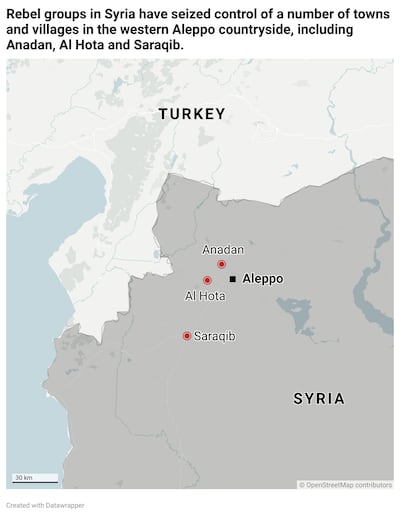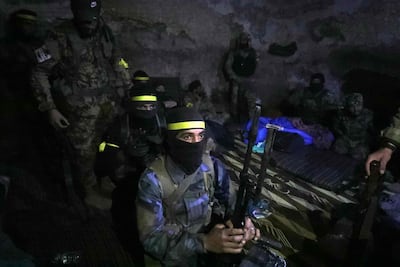Extremist rebels in Syria have overrun an army base and taken at least 13 villages in one of the biggest flare-ups of violence in years in the country's north-east.
The rebels launched a surprise attack on the Syrian army in the northern province of Aleppo, causing clashes in which at least 182 people were killed, the Syrian Observatory for Human Rights said.
The exact death toll was unclear, with news agency AFP reporting that more than 200 had died, mostly combatants, while the SOHR said there were 182 military fatalities.
Brig Gen Kioumars Pourhashemi, a senior adviser in Iran's Islamic Revolutionary Guard Corps, was killed in the fighting, Iran's IRGC-managed Fars news agency reported.
The rapidly advancing troops of extremist group Hayat Tahrir launched the offensive, which they called Deterring the Aggression, late on Wednesday, moving towards Aleppo city from Idlib, home to about two million people displaced from civil-war fighting since 2011.

The rebels cut off the major motorway linking Damascus and Aleppo, the observatory said.
Idlib has been under the control of the group since 2019 when it pushed out other rebel factions in a series of clashes. According to Charles Lister, a US-based analyst tracking the violence in Syria, the rebel offensive is only 6km from Aleppo, a city that suffered widespread destruction between 2012 and 2016.
Hayat Tahrir was formerly aligned to Al Qaeda but said it had split from the terror organisation in 2016, when the force was known as Jabhat Al Nusra. It comprises a number of militant rebel factions but in recent years has tried to distance itself from extremist ideology. This effort, according to extremism expert Mackenzie Holtz, is more of a rebranding than a “genuine change in ideology”.
Russian and Syrian aircraft reportedly launched heavy air strikes on the advancing militias. According to Reuters, fighters from Iran-backed Hezbollah had been present in some of the contested areas in the rebel offensive.
Hayat Tahrir has been accused of extremely violent crackdowns on protesters in areas under its control and killing other opposition members opposed to its authoritarian leanings. It said it was launching the offensive in response to Russian and Syrian attacks on civilian areas in Idlib. In recent months, people in Idlib have reported drone attacks on civilians using quadcopter drones rigged with bombs. Syrian troops regularly shell the area, which has also suffered serious food shortages in recent years.
The Syrian Arab News Agency said that armed forces had confronted the "large-scale terrorist attack, with large numbers of terrorists and using medium and heavy weapons," and inflicted "heavy casualties," citing the military command.

In an echo of the early years of the Syrian civil war, which erupted in 2011 after a violent government oppression of a civilian protest movement, militants could be seen seizing stockpiles of anti-tank missiles known as Kornets from a Syrian base. The National was unable to verify video footage published on opposition accounts.
The weapons, which are lethal against tanks and infantry positions, were critical for the massive advances of rebel groups early in the war, until Russia intervened in 2015 with significant air power, devastating towns and villages in rebel hands and pushing them back into Idlib.
Several other parts of northern Syria remain outside regime control, including formerly Kurdish-majority areas on the Turkish border, now occupied by the Syrian National Army, a force mainly composed of former Syrian rebels backed and armed by Turkey. In the east of the country, areas of land along the Iraqi border and Euphrates river are controlled by US-backed, mainly Kurdish militias in the Syrian Democratic Forces coalition.

